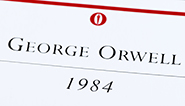3 Summary of Nineteen Eighty-Four
In Nineteen Eighty-Four, the world is divided into three perpetually warring super states – Oceania, Eurasia, and Eastasia. Britain (following a long-forgotten atomic war) is now known as Airstrip One – a province of Oceania – and London is its chief city. The state (the Party) presided over by the omniscient ‘Big Brother’ uses technology to exert total control over everything and everyone. Tele-screens are positioned in people’s homes as a means of surveillance. Posters on walls warn that ‘Big Brother is watching you’. No one can escape the scrutiny of the Thought Police, and ‘spies and saboteurs’ will be rooted out. The Party is even in the process of transforming existing standard English, Oldspeak, into a new simplified official language, Newspeak. Once Newspeak has finally superseded Oldspeak, there will be no vocabulary for the expression of ‘heretic’ thoughts or ideas.

Nineteen Eighty-Four depicts a fearful, atomised society in which a spurious unity is forged through a compulsory ‘love’ of Big Brother and the brief collective disinhibited hysteria of the daily ritual of the ‘Two Minutes Hate’ – directed at the tele-screened image of the ‘arch-traitor’ Emmanuel Goldstein (the ‘Enemy of the People’). This is a society in which young children are encouraged to denounce their parents and people may disappear (vaporised) overnight. Only the ‘proles’ (the uneducated masses) live relatively ‘free’ lives – deemed too unimportant and too indolent to threaten the power of the Party.
In the novel, the main character, Winston Smith, a minor civil servant in his 30s, is employed in the Records Department of one of the four branches of government – the so-called Ministry of Truth. In reality, the Ministry of Truth, concerns itself with lies. The Ministry of Peace concerns itself with war. The windowless Ministry of Love maintains order through terror, and the Ministry of Plenty presides over a society of permanent scarcity. One of the functions of the Ministry of Truth is to rewrite the past according to the whims of the Party. Winston’s job is to alter (or in the official phrase, to ‘rectify’) figures and other inconvenient facts in back numbers of newspapers, books, and other documents. It is, nonetheless, routine work within a large department and Winston is an insignificant member of the ‘Outer Party’ (a group not admitted to the privileged ‘Inner Party’).
Winston lives alone in a small, dingy flat in Victory Mansions, a nondescript apartment block in central London. As the novel opens, Winston is harbouring subversive thoughts. As an act of rebellion, he has purchased a notebook with the intention of keeping a diary – an act punishable by death or, at the very least, 25 years in a forced labour camp.
Activity 2
What significance do you attach to Orwell’s terminology here: ‘the Ministry of Truth’ and ‘the Ministry of Peace’?
Discussion
This is, of course, an example of how Orwell uses irony in the novel. Each of the four government ministries operates in a manner that is the direct opposite of what their names would imply. In the world of Nineteen Eighty-Four, however, 'reality' is what the totalitarian state says it is.
Orwell’s novel is a far from comforting read, but it is also one that helps many people make sense of what is happening in the world. After the end of the Cold War, and the subsequent implosion of the Soviet Union (1989–91), it might have been assumed that Nineteen Eighty-Four would soon lose its relevance. When Berlin Wall fell, it was a common assumption (in the West at least) that the world could only move in one (progressive) direction – more open, more liberal, more democratic. Now, over 30 years later, it is only too evident that such optimism was misplaced. Liberal democracy is now under considerable strain and new forms of authoritarianism are on the rise around the world.
